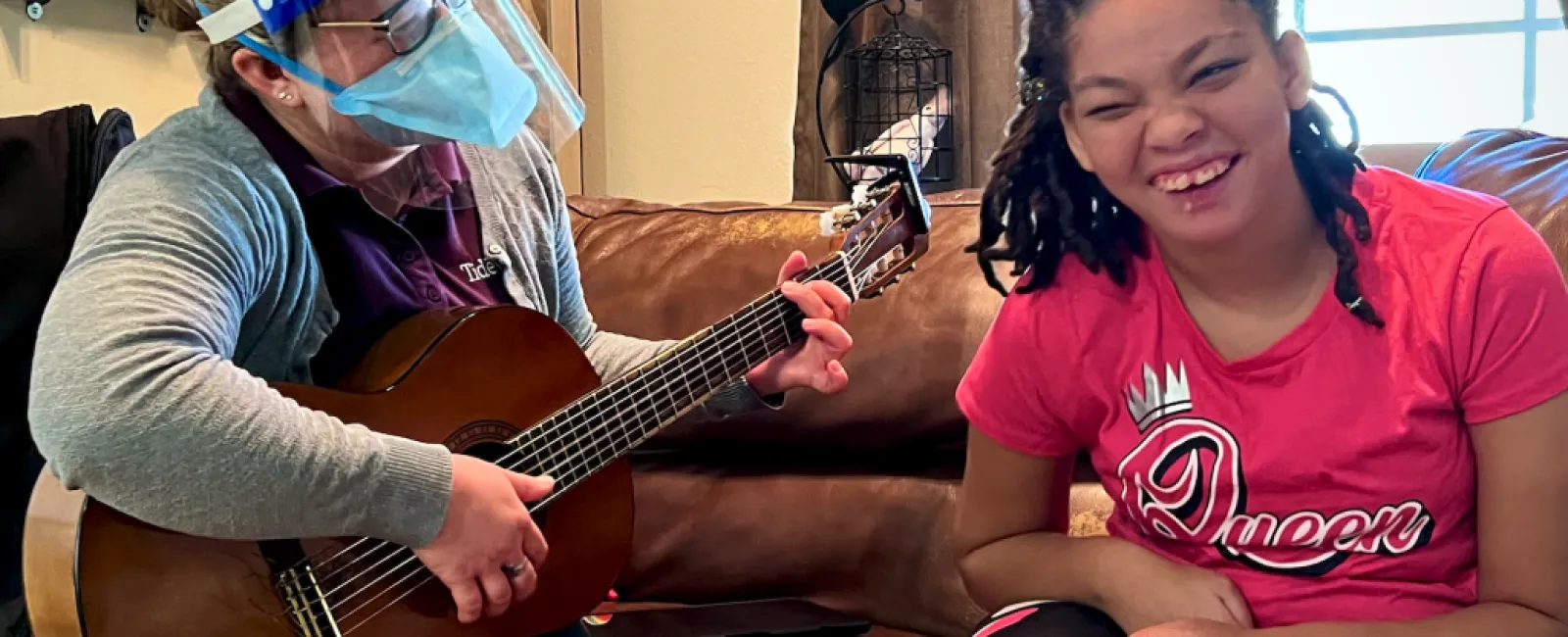Music therapy is not a passive activity for Chandrea Owens-Hicks.
When Tidewell Hospice Music Therapist Sarah Michaels, MT-BC, plays the guitar and sings, Chandrea sways with the music, claps her hands, bangs a small drum and occasionally yells out, mimicking a song lyric or exclaiming with joy.
But by far Chandrea’s favorite activity is reaching out and plucking Michaels’ guitar strings, laughing when she hears the tone.
“Sometimes even before I get set, she is reaching for it, trying to play it,” Michaels said. “She does that on her own.”
Chandrea, who turned 14 on Feb. 16 and lives with grandparents Ty and Jen Hicks in Parrish, has been a patient in Tidewell Hospice’s Partners in Care Program, a Medicaid waiver program for children with advanced illness, for nearly five years. Chandrea suffers from Aicardi syndrome, a rare genetic disease marked by missing or underdeveloped tissue connecting the left and right halves of the brain. The syndrome affects 1 in about 100,000 infants, almost exclusively girls. Life expectancy is between 8 and 18 years, though Jen Hicks said she was told not to expect Chandrea to make it to her second birthday.
Because Aicardi Syndrome is related to epilepsy, Chandrea endures seizures on a regular basis. Her grandmother says Chandrea enjoys things that normal teenagers like, but she responds to stimuli much like a 1-year-old.
Michaels joined Tidewell in October 2020 and has been working with Chandrea ever since. They meet for 30 minutes every Monday morning. Chandrea’s favorites are Disney songs and Katy Perry songs, and she gets to choose what Michaels plays by hitting a “yes” or “no” button. During a Feb. 14 music therapy session, Michaels played “Let It Go” from the movie “Frozen” and “Kiss the Girls” from “The Little Mermaid.” But on this day, she said “no” to one of her favorites, “Roar” by Katy Perry.
“She loves the guitar. Anytime she plays the guitar, always positive feedback,” Michaels said. “We work on communication with the button, getting her to say yes or no.”
Michaels also works with Chandrea on fine-motor skills and movement. Chandrea doesn’t like opening her left hand, so clapping and drumming are important skills.
Jen Hicks said Chandrea always perks up when it’s time for music therapy.
“I love it because, one, it gives her something else that she looks forward to because she does enjoy it,” Hicks said of Chandrea. “She loves music in general, so it’s nice to have that one on one versus just listening to the radio. She does get to interact with the different instruments.
“I like having special people in her life because when you have a special-needs (child), everybody starts out wanting to help, then all of a sudden there’s nobody around. You find yourself alone. It’s nice to have that because those are people who directly impact her life. It’s people who are part of her daily that she looks forward to.”
Music therapy is one of several complementary services Tidewell offers to add comfort and quality of life to those with advanced illness and their loved ones.
Tidewell employs four full-time music therapists who hold degrees and board certifications. They touch thousands of lives each year by making regular visits to patients in their homes, hospice houses and other facilities as requested. The music therapists are trained in the use of music for relaxation and reminiscence. Songwriting projects are often used for life review and legacy purposes.
Tidewell Hospice, an Empath Health company, is a not-for-profit organization, and Tidewell’s Music Therapy program is donor-supported and offered for free to patients and families through the work of the Tidewell Foundation, Inc.
